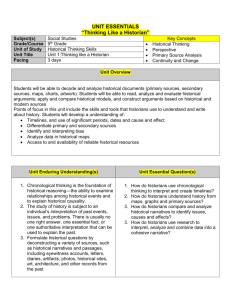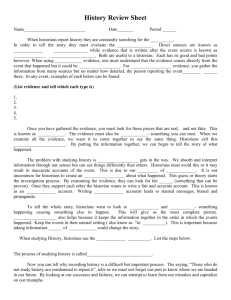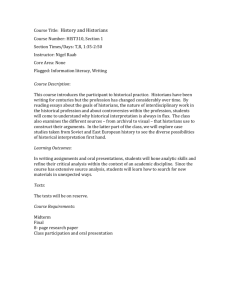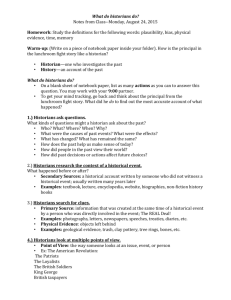History as an Academic Discipline - Online
advertisement
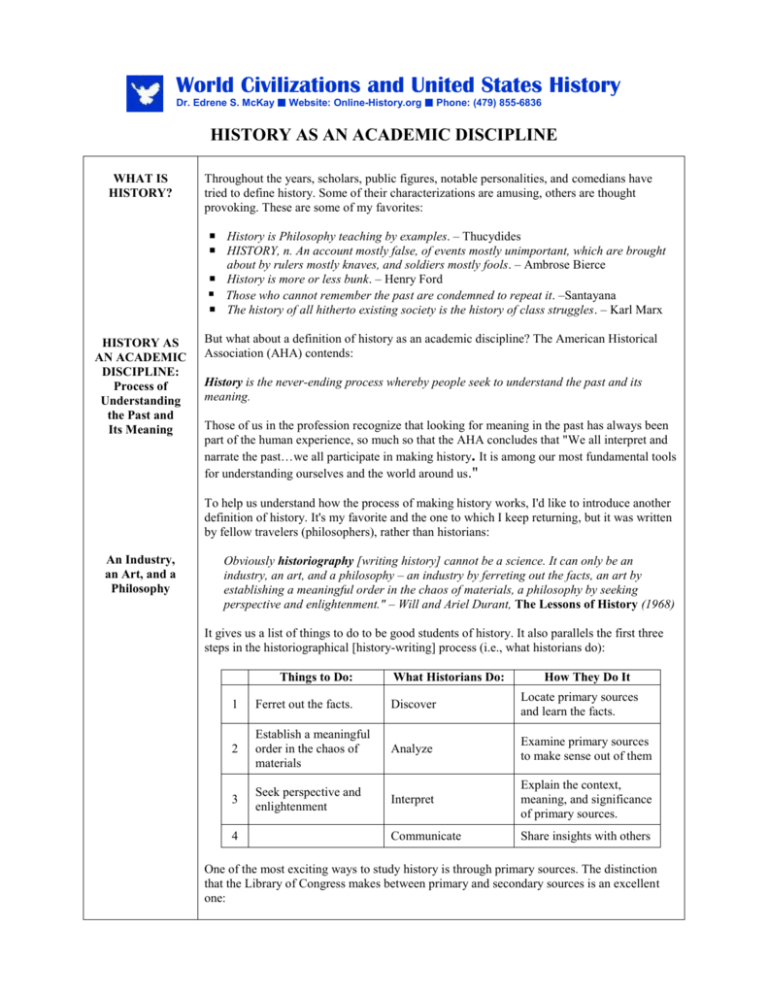
World Civilizations and United States History Dr. Edrene S. McKay Website: Online-History.org Phone: (479) 855-6836 HISTORY AS AN ACADEMIC DISCIPLINE WHAT IS HISTORY? Throughout the years, scholars, public figures, notable personalities, and comedians have tried to define history. Some of their characterizations are amusing, others are thought provoking. These are some of my favorites: History is Philosophy teaching by examples. – Thucydides HISTORY, n. An account mostly false, of events mostly unimportant, which are brought about by rulers mostly knaves, and soldiers mostly fools. – Ambrose Bierce History is more or less bunk. – Henry Ford Those who cannot remember the past are condemned to repeat it. –Santayana The history of all hitherto existing society is the history of class struggles. – Karl Marx HISTORY AS AN ACADEMIC DISCIPLINE: Process of Understanding the Past and Its Meaning But what about a definition of history as an academic discipline? The American Historical Association (AHA) contends: History is the never-ending process whereby people seek to understand the past and its meaning. Those of us in the profession recognize that looking for meaning in the past has always been part of the human experience, so much so that the AHA concludes that "We all interpret and narrate the past…we all participate in making history. It is among our most fundamental tools for understanding ourselves and the world around us." To help us understand how the process of making history works, I'd like to introduce another definition of history. It's my favorite and the one to which I keep returning, but it was written by fellow travelers (philosophers), rather than historians: An Industry, an Art, and a Philosophy Obviously historiography [writing history] cannot be a science. It can only be an industry, an art, and a philosophy – an industry by ferreting out the facts, an art by establishing a meaningful order in the chaos of materials, a philosophy by seeking perspective and enlightenment." – Will and Ariel Durant, The Lessons of History (1968) It gives us a list of things to do to be good students of history. It also parallels the first three steps in the historiographical [history-writing] process (i.e., what historians do): Things to Do: What Historians Do: How They Do It 1 Ferret out the facts. Discover Locate primary sources and learn the facts. 2 Establish a meaningful order in the chaos of materials Analyze Examine primary sources to make sense out of them 3 Seek perspective and enlightenment Interpret Explain the context, meaning, and significance of primary sources. Communicate Share insights with others 4 One of the most exciting ways to study history is through primary sources. The distinction that the Library of Congress makes between primary and secondary sources is an excellent one: History as an Academic Discipline PRIMARY SOURCES Page 2 Primary sources are actual records that have survived from the past [i.e., eyewitness accounts of the past] such as letters, photographs, and articles of clothing. Secondary sources are accounts of the past created by people writing about events sometime after they happened [i.e., information gathered by those who did not witness these events personally]. Historians discover primary sources in archives and attics, put order into the chaos of materials, analyze and interpret them, and then communicate what they have learned to others. How Historians Use Primary Sources Historians speak to us in behalf of the men and women of the past. However, the men and women of the past speak directly to historians – through letters, diaries, newspaper ads, public documents, photographs, remnants of clothing, furniture, tools, and other artifacts. Using primary sources gives students of history an opportunity to enter the laboratory and to do what historians do. If you were taking a biology course, there would be a laboratory component and you would have to dissect worms, grasshoppers, and other unspeakable things – just like a biologist does. In this course, you will have an opportunity to discover, analyze, interpret, and communicate primary sources – just like the historian does. And there won’t be any formaldehyde involved. I promise. RELIABILITY Always Based on Primary Sources That Have Been Analyzed Subject to a Review Process Standards of Professional Conduct Optional Activity Students of history often raise some good questions about truth and reality and whether we can ever know the truth about the past. Well, we aren’t left completely adrift to determine what’s fact and what’s fiction. There are some ways we can figure out whether the history we are reading is reliable. History written by professional historians is the most reliable because it is based upon primary sources that are subjected to a great deal of scrutiny before they are accepted. As you might suspect, primary sources, written by people who participated in the events, can be emotional, exaggerated, or in some other way distorted. So historians have to examine those sources, evaluate them, and compare them to other accounts before accepting them as true. But can professional historians be trusted to tell the truth since they, too, have points of view? It's really not that difficult to insure the accuracy of what you read. There is a peer review process that insures high quality work. When historians publish books or journal articles, their work is refereed (or judged) by a panel of experts in the field before it can be published. This way they check up on each other to insure accuracy. Then after it is published, other experts in the field publish detailed reviews in prestigious journals like the American Historical Review, the Journal of American History, and William and Mary Quarterly. If the work has a "spin" or personal interpretation that is not supported by the facts, it will come out in the review process and the historian's work will not be respected. In addition, historians in the United States have a professional organization, the American Historical Association, which has published a "Statement on Standards of Professional Conduct." The standards include a section entitled "Shared Values of Historians." This section begins with a statement of purpose and concludes with a set of core values: Purpose: Historians strive constantly to improve our collective understanding of the past through a complex process of critical dialogue—with each other, with the wider public, and with the historical record—in which we explore former lives and worlds in search of answers to the most compelling questions of our own time and place…. Core Values: Historians should practice their craft with integrity. They should honor the historical record. They should document their sources. They should acknowledge their debts to the work of other scholars. They should respect and welcome divergent points of view even as they argue and subject those views to critical scrutiny. They should remember that our collective enterprise depends on mutual trust. And they should never betray that trust. History as an Academic Discipline Page 3 Proper Credentials We can be reasonably certain that a professional historian's work is reliable. But how does the layman know if an author has the proper credentials or not? You won't find sources signed by John Doe, professional historian. But there are ways to determine the background and training of an author. If it's a book, the jacket usually gives you this information. Look for a Ph.D. in history. Sometimes this also appears in a short biographical sketch inside the book. If it’s an article, most journals and magazines indicate the author's credentials in a sidebar. If the article comes from the Internet, it may be more difficult to tell. But usually authors tell you something about themselves somewhere on the website. You just need to do a little digging. Reputable Organizations Other indications of quality are: an “edu” website, a course-related website, or a website created for PBS, network television, or non-profit organizations. When groups like these get involved, they have reputations to uphold, so they are careful to consult professionals. If you are in doubt, go to Amazon.com and see what else the author has written and read some of the reviews published there. Keep in mind, however, these reviews were written by people who buy books, not professional historians. If the work is important enough to be considered by the professionals, you’ll find reviews in the journals I mentioned. Academic Freedom We are fortunate here in the United States that historians have academic freedom and are not controlled by the government. For example, there are historians and other academics who do not approve of the war in Iraq and are already collecting material to make their case. There's even an organization called Historians Against the War (HAW). So in this country academics are not puppets of the government like they are in totalitarian or authoritarian states. Children’s Textbooks May Be Less Reliable THINKING ABOUT THIS SUBJECT Optional Activities What appears in textbooks, however, may be another story. Unfortunately, the selection of textbooks in elementary and high schools often is controlled by school boards, ordinary citizens who may have a misguided sense of patriotism and want students to have only the highest respect for their country and its leaders. So what students read may be much less reliable than what we read as adults. What is your favorite definition of history? Why? Does your definition of history relate to any of the steps in the four-step historiographical process of discovery, analysis, interpretation, and communication? Explain. What evidence do you find in the American Historical Association's "Statement on Standards of Professional Conduct" that historians are committed to high standards of professional conduct? Explain the difference between primary sources and secondary sources. If future archaeologists had the materials listed below, what could they infer or conclude about your life? What might the materials tell historians about your family, community, region, and/or nation? The trash you have thrown away; Material objects you use every day (coins, paper money, stamps, computers); Objects in the place you live (especially in your bedroom); Items in your automobile. Why is it important for history to be reliable? If one of the purposes of history is to learn from the past, why do we keep making the same mistakes? What makes for good history? Is reliability, credibility, and objectivity enough?


